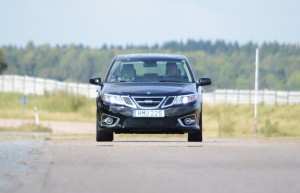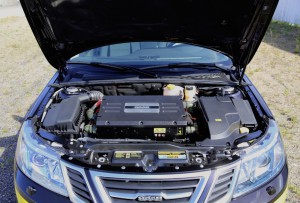
It may look like a Saab, but it's not a Saab. Talks between Swedish aerospace company and Nevs, the Chinese firm building EV versions of the 9-3, fell apart.
Saab is back … sort of.
Fans of the Swedish cars “born from jets” rejoiced in December when news broke that the defunct company was being resurrected by a a group of Chinese investors and renamed National Electric Vehicle Sweden, or Nevs, with the idea that they iconic vehicles would be remade into electric vehicles.
However, lost in the hoopla was the fact that this new company didn’t have the rights to the name Saab, which is still held by Saab AB, the aerospace and defense company. According to Automotive News, the new company won’t be getting to use the name or logo either.
“We have revoked their right to use the brand name,” Saab AB spokesperson Sebastian Carlsson told the publication. He also confirmed that all discussions have ended.
(To see more about the revival of Saab as an electric vehicle, Click Here.)
It’s not the first time this has happened. When SAIC purchased vehicle technology from British carmaker MG Rover after it went bankrupt; however, BMW owned the rights to the Rover name and barred SAIC from using it. SAIC simply renamed it the brand something British sounding and looking: Roewe, and the brand was born in China.
Nevs owner Kai Johan Jiang appears ready to follow that example, telling a Swedish radio station that the company will select a new name for the electrified former 9-3 sedans when they go on sale.
The first iteration will actually be available for purchase in China and Sweden in 2017, according to the company. It will be followed by the debuts of four more EVs, including a sports car, SUV, crossover and a fastback, according to the company.
The 9-3-style sedan will also be available for fleet use. Nevs signed a $12 billion deal to provide 150,000 9-3-style sedans for Panda New Energy Co, a vehicle leasing company that features green vehicles in its fleet.
(Click Here for details about why auto suppliers are expecting an acquisition binge.)
The vehicles should be delivered by the end of 2020, and the deal also calls for Nevs to provide an additional 100,000 other EVs and a variety of unnamed services.
“This is a strategic collaboration for Nevs not only in terms of the numbers of vehicles, but it is also an important step to implement our vision and new business plan. In the long term, we want to provide our customers with both sustainable products and mobility services,” said Stefan Tilk, Nevs vice chairman, when the deal was announced two months ago.
The Chinese/Swedish EV bodies will be produced in the traditional home of Saab: Trollhattan, Sweden. The bodies will be paired with the EV powertrain in Tianjin, China, and shipped from there.
This is only the latest twist in the saga that has been Saab since General Motors gave it up during its bankruptcy in 2009. Initially, Spyker Cars of the Netherlands bought the company and thought it could resurrect it, but lacked the financial and technical resources to do so. It languished in bankruptcy at that point until the Chinese investors purchased it in 2012.
(Another Saab story: new owners narrowly sidestep new bankruptcy. For more, Click Here.)
After starting off in 2013 producing gasoline-fuelled models, Nevs announced in May 2014 a production stop of the 9-3 sedans due to cash flow problems.

